|
|
| |
| EVENTS |
|
|
> Civil Military Dialogue
|
| |
|
Dialogue for Parliamentarians
September 20-21, 2004
Hotel Marriott, Islamabad
Programme Details |
|
|
| |
|
|
| |
| The first sitting of the �Track 2 Civil Military Dialogue�
was organized by PILDAT on September 20-21st, 2004 at Marriott Hotel,
Islamabad, and was attended by 12 participants. PILDAT felt that a dialogue
between the civil and military minds needed to be initiated to promote a
greater understanding of each others perspectives. It is hoped that this
dialogue may, in time, evolve into a mechanism and acquire such influence
and respect that it contributes to the promotion of civil-military
understanding. This understanding will hopefully eventually lead to a
political arrangement in line with the constitution where both politicians
and the military operate within their allotted confines like all stable
democracies |
The Dialogue was attended by the following participants:
|
- Lt. Gen. (R) Asad Durrani, Former Director General Inter-Services
Intelligence Agency
- Mr. Ghulam Mustafa Khar, Former Chief Minister Punjab
- Mr. Gohar Ayub Khan, Former Speaker National Assembly
- Lt. Gen. (R) Hamid Gul, Former Director General Inter-Services
Intelligence Agency
- Dr. Hasan-Askari Rizvi, Political Analyst, Former Chairman Political
Science Department,Punjab University
- Mr. Javed Jabbar, Former Federal Minister and Senator
- Dr. Mubashar Hassan, Former Federal Minister
- Mr. Mujib-ur-Rehman Shami, Editor in Chief, Daily Pakistan
- Mr. Shafqat Mahmood, Former Senator and Provincial Minister
- Makhdoom Shah Mahmood Hussain Qureshi, MNA, Former Federal Minister
- Brig. (R) Shaukat Qadir, Former Vice President, Islamabad Policy
Research Institute
- Lt Gen. (R) S. Tanwir H. Naqvi, Former Chairman National
Reconstruction Bureau
|
The dialogue spanned over four working sessions. Working
Session I was focused on �Situation-Analysis of Civil-Military Relations in
Pakistan � where do we stand today?� The Session opened with Dr.
Hasan-Askari Rizvi�s presentation on the subject. His main thesis was that
the military has permeated into all major sectors of society with clear
political and corporate interests. According to Dr.Askari the military is
the most formidable and autonomous actor and a contender for power. A
discussion lasting for about two hours ensued during which some participants
agreed with Dr. Askari�s views while other disagreed. Some alternative
viewpoints were also advanced.
The subject of Working Session II was �The Factors behind Military
Intervention in the political system of Pakistan�. The speakers at this
session were Mr. Shafqat Mahmood, Former Senator and Provincial Minister,
and Lt. Gen. (R) Asad Durrani, Former Director General Inter-Services
Intelligence Agency. Mr. Shafqat Mahmood, emphasized that over a period of
time, popular leaders and popular parties had been deliberately and
systematically undermined and that he was unable to foresee political
parties being strong enough to challenge military hold. He said that the
military sought self-preservation through takeovers whenever it was
challenged. According to Lt. Gen. (R) Asad Durrani, all military takeovers
took place under different circumstances and for different reasons therefore
it is difficult to find a common motivation for the interventions. He said
the military has neither the will nor the desire to intervene; it was always
forced to by circumstances. A discussion took place. A discussion took place
among participants following the two presentations.
|
| Working Session III entitled �Within the framework of the
constitution of Pakistan, what maybe the key short, medium and long-term
measures acceptable to both civil and military institutions to create a
democratic dispensation and avoid military intervention in political affairs
of the state?� consisted of presentations by Makhdoom Shah Mahmood Hussain
Qureshi, MNA, Former Federal Minister, and Lt Gen. (R) S. Tanwir H. Naqvi,
Former Chairman National Reconstruction Bureau. Mr. Qureshi pointed out that
contradictory civil-military perceptions were giving rise to polarization in
the country that hindered a national consensus which was of vital
importance. Mr. Qureshi stated that political parties needed reform and
strengthening and media deserved more freedom. In conclusion, he emphasized
that a crisis management strategy should be evolved in order to prevent
future military interventions. According to General (R) Tanwir H. Naqvi, the
underlying cause of army interventions has been the failure of civilian
governments to govern with even a modicum of honesty and efficiency and
therefore their failure to provide good governance. He stated that an
institutional approach was needed rather than a political one, and suggested
initiating a political dialogue as a means to seek a permanent institutional
solution. According to General Naqvi, the Civil-Military Dialogue needs to
focus on seeking an agreement and building a consensus among the current
civilian and the military leadership on the restructuring of state
institutions. He proposed some political reforms such as introduction of a
Presidential form of government and creation of more provinces. He felt
these reforms would result in political stability, therefore military
interventions will become unnecessary. During the discussion that followed,
participants gave their views on General Naqvi�s presentation. There was
disagreement on some of the points raised by General Naqvi. Some
participants felt that such large-scale restructuring was beyond the scope
of this dialogue and that reform was an on-going exercise. |
During the course of the discussion held during the
Dialogue, some of the broad conclusions reached by participants were the
following: |
| |
- Military interventions are not desirable and there is a need to
develop an institutional mechanism to prevent future interventions.
- Political institutions and in particular political parties have
weakened considerably as a result of military interventions and need to
develop as a more cohesive force and work towards establishing a stable
political system not vulnerable to military interventions.
- Civilian parties are not absolved of responsibility for the frequency
of military take-overs and have willingly co-opted with martial law
regimes to promote their own interests.
- There was not a consensus on the reasons why the military pursued
political power. Among the different perceptions expressed by
participants, the three main perspectives were:
- The military was not willing to intervene but the lack of political stability
and poor governance forced it to take reign of the country in the interest
of national security.
- Military takeovers took place in different circumstances and for different reasons. The only common denominator is a set of circumstances that threaten the country�s stability.
- The military has a very clear political agenda and corporate
interests and has strategically infiltrated civilian institutions to
establish its presence as it is a strong contender for political power
- All participants thought it was futile to review the past and play the
blame game and instead felt that they should learn from the past and use
lessons learned to build a more cohesive relationship between civil and
military institutions in the future.
- Participants felt that institutional reform of both civil and military
institutions was a priority that needed to be addressed.
- All participants felt the need for the dialogue and agreed to continue
the process.
- It was agreed to explore the possibility of co-opting some active
military minds into the dialogue by approaching the institution through
their chain of command. Some participants agreed to assist this effort.
|
| |
|
|
| |
|
|
| |
|
|
| |
|
|
| |
|
|
| |
|
|
| |
|
|
| |
|
|
| |
|
|
| |
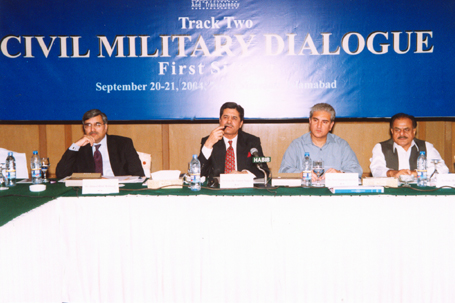
|
|
| |
|
|
| |
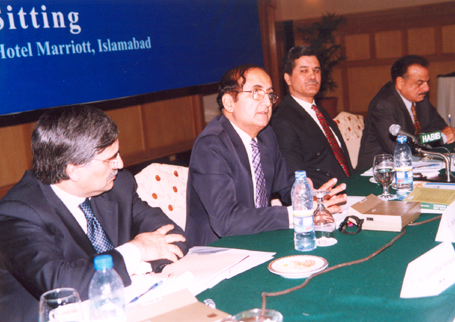
|
|
| |
|
|
| |
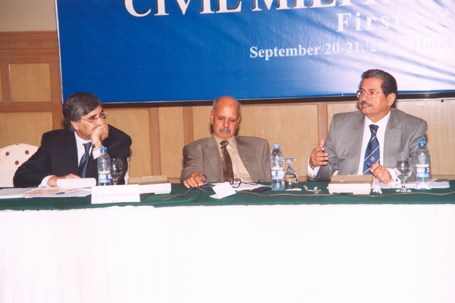
|
|
| |
|
|
| |
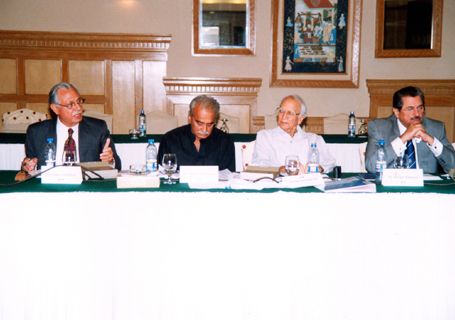
|
|
| |
|
|
| |
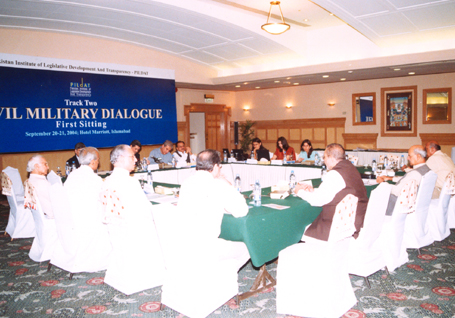
|
|
|
|
|
|
|
|
|